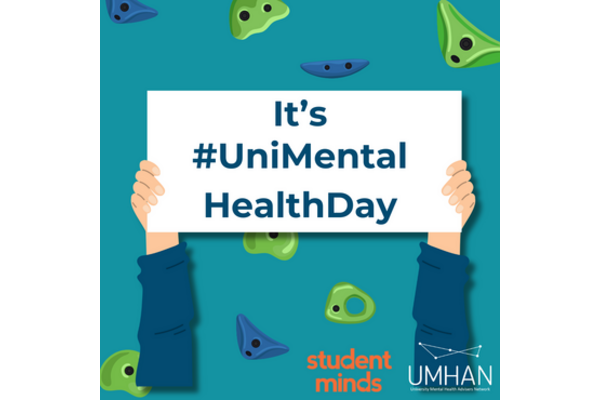When I joined UMHAN in August 2023 I was excited to learn more about what our members do. I’d worked in Higher Education on and off over the last 20 years mainly in institutional research roles focused on widening participation and student experience projects. I thought I had a fairly good idea of the support available to students with mental health conditions having worked closely with colleagues who led an Office for Students funded mental health project at the University of Lincoln. I’d also been a university student multiple times and had engaged in some support for my own mental health condition over the years.
So, when it came to scoping the existing research relating to the work of our members who are mainly Mental Health Advisers and Specialist Mental Health Mentors (SMHMs) (plus managers and other associated wellbeing and mental health staff) I was surprised to find that whilst there was something relatively recent evidencing the work of SMHMs (see Matthews, 2020) there wasn’t one study that specifically looked at MHAs. I put together a project proposal for a small research study to the UMHAN Board of Trustees in January of this year and [waves a magic wand] the report was finished in September.
Best laid plans
For anyone that’s undertaken research, you’ll know that your detailed plan of what you intend to happen doesn't always match up with the reality. The basis of the study was a literature review, focus groups with MHAs (UMHAN members) and interviews with students who had recently or were currently receiving support from a MHA.
The literature review progressed well – as I mentioned, there was not one specific research or evaluation project dedicated to gathering empirical evidence of the work that MHAs do but there was certainly a lot of grey literature – reports from professional bodies and other third sector organisations and MHAs were mentioned in numerous academic journal articles even if they were not necessarily the focus of an article or study.
The focus groups with MHAs were also a success. UMHAN members were keen to be involved and in April I facilitated three online focus groups with a total of 15 MHAs, working in a range of different universities of varying histories and make up. A big thanks from me for their participation in the study.
But the interviews with students didn’t go as planned. It turned out to be incredibly hard to recruit students/graduates as our organisation is primarily practitioner facing and even with members kindly sharing details of the study where they could and were permitted to do so ethically, it was tough going. As a last attempt I created an online survey, shared again with members, in the hope that they could pass it on to students and I also shared it on social media. Just five (real) students completed it even with some modifications to prevent fraudulent responses – bots completing online surveys is a big problem for researchers now (I’d recommend this paper by Pozzar et al. (2020)). But five is better than none and it was still an opportunity to assess the questions and scales used in the survey and to hear from five students who had had support from a MHA. Thank you to them for taking part.
What I learned
The range of support that MHAs can and do provide really is quite astounding. Capturing practitioners’ voices was also important – so often research and evaluation projects just focus on managers or senior leaders – but the tacit knowledge of MHAs was recognised and documented. I’m not going to repeat what the report says here but I encourage to you to read it whether you are a MHA yourself, a mentor, manager, or work in student support services. I’d definitely recommend you read it if you are a manager or senior leader in HE.
But I have to say that the dedication, skills, expertise and compassion of MHAs shines through in the report, as they considered what the most important parts of their job for the students that they work with are - such as listening to the student without judgement and being a named individual within a university that a student could contact:
I think what a lot of our students' value is probably just the opportunity to be heard.
The most important thing is just validating what they're going through and listening to it without any judgement.
MHAs also shared how they assessed risk in the students they worked with, and many described how, in the absence of capacity within the NHS for diagnoses or access to specialist services, they became a default ‘holding bay’ of students at risk. I wasn’t surprised to hear this having undertaken our Member Survey in 2023 which had highlighted that referrals by UMHAN members to NHS services were an ongoing source of concern with some members unable to refer directly to NHS services whilst others described how their referrals were ignored or not accepted (Spacey, 2023).
I think a lot of external NHS services, that certainly our team has had experience of, sort of have in the past when they've noted that the student has been accessing support through our service, viewed that as enough support for that student, to the point where they don't need to engage, when really they should be engaging to support that student, that individual, and I think that obviously leaves us in a risky position and that… can be difficult and can impact on your wellbeing as an individual and as a team as well.
The report also looks at the history of the MHA role as well as exploring MHAs views of the impact of their work and how that can be measured. Even though the data from students was limited it suggested that the aspects of MHA support they valued ‘a great deal’ were MHAs ‘being a constant source of support while at university’ and ‘being a named person/point of contact I can go to for help’. The changes they had experienced since seeing a MHA that most strongly resonated were ‘I feel like I can finish my programme/course’ and ‘I've been able to work through traumatic experiences’:
She has provided me with invaluable support and helped me process things at my own pace. She took the time to listen and allowed me to be myself. Her genuine care for me has meant a lot, and I don't know how I would have gotten through my master's without her [Sam, postgraduate student].
What I hope happens next
That’s just a snapshot but I hope that the report contributes to what we know about what MHAs do and the benefits of their support to students with mental health conditions. Please take a look and share it with colleagues. There's a very short summary available too.
There are some gaps, of course, which future research projects might like to consider particularly that we need to know more about students’ experiences of MHA support, preferably in a longitudinal study across the student lifecycle (from pre-entry to graduation), within and across HEPs.
If that’s something you’re interested in talking to us about at UMHAN, please get in touch.
References
Matthews, A. (2020) The Role & Impact of Specialist Mental Health Mentoring on Students in UK HEIs.
Spacey, R. and Gamblin, S. (2023) UMHAN Member Survey 2023 Report.
Spacey, R. (2024) The role and benefits of Mental Health Advisers in Higher Education: an exploratory study.









